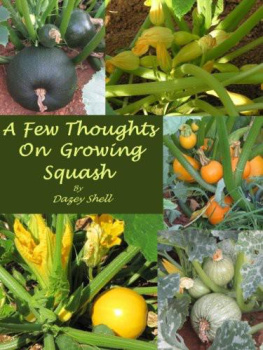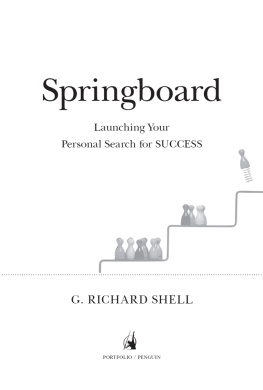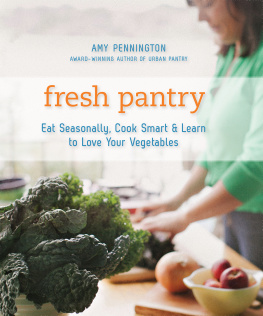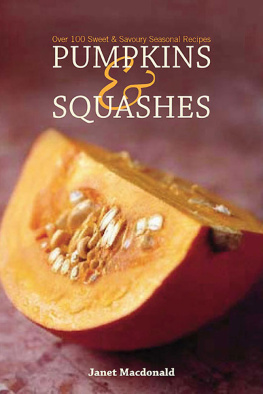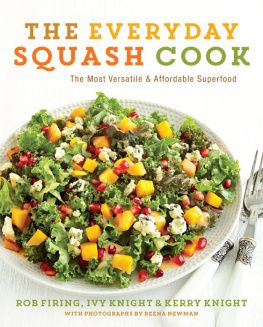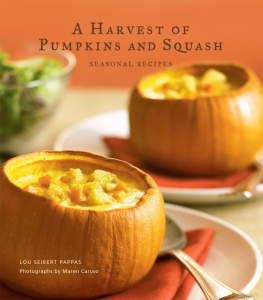Shell - A Few Thoughts on Growing Squash
Here you can read online Shell - A Few Thoughts on Growing Squash full text of the book (entire story) in english for free. Download pdf and epub, get meaning, cover and reviews about this ebook. year: 2012, genre: Home and family. Description of the work, (preface) as well as reviews are available. Best literature library LitArk.com created for fans of good reading and offers a wide selection of genres:
Romance novel
Science fiction
Adventure
Detective
Science
History
Home and family
Prose
Art
Politics
Computer
Non-fiction
Religion
Business
Children
Humor
Choose a favorite category and find really read worthwhile books. Enjoy immersion in the world of imagination, feel the emotions of the characters or learn something new for yourself, make an fascinating discovery.
- Book:A Few Thoughts on Growing Squash
- Author:
- Genre:
- Year:2012
- Rating:5 / 5
- Favourites:Add to favourites
- Your mark:
- 100
- 1
- 2
- 3
- 4
- 5
A Few Thoughts on Growing Squash: summary, description and annotation
We offer to read an annotation, description, summary or preface (depends on what the author of the book "A Few Thoughts on Growing Squash" wrote himself). If you haven't found the necessary information about the book — write in the comments, we will try to find it.
I mostly grow round or ball squash, but my thoughts on planting and growing them are the same methods that I use for growing the traditional summer and winter squash.
Theres over 2 dozen photos including a couple of galleries in the back of the book some of the squash varieties, along with their name and if theyre summer or winter squash.
Shell: author's other books
Who wrote A Few Thoughts on Growing Squash? Find out the surname, the name of the author of the book and a list of all author's works by series.
A Few Thoughts on Growing Squash — read online for free the complete book (whole text) full work
Below is the text of the book, divided by pages. System saving the place of the last page read, allows you to conveniently read the book "A Few Thoughts on Growing Squash" online for free, without having to search again every time where you left off. Put a bookmark, and you can go to the page where you finished reading at any time.
Font size:
Interval:
Bookmark:
A Few Thoughts on
Growing Squash
by
Dazey Shell
A Few Thoughts on
Growing Squash
by
Dazey Shell
Copyright 2012 Dazey Shell
All Rights Reserved
Thank you for downloading this ebook.
This book, its photos, imagery & contents are the
copyrighted property of Dazey Shell,
and may not be reproduced,
copied or distributed for commercial or non-commercial
purposes without written permission from the author,
Except for mentions or brief excerpts used for discussion.
~*~
For my Grandson, Husband & Sister.
Your love & humor fills my heart with joy.
You all are the best!
Table of Contents
Disclaimer:Im not a professional gardener and Im not an expert. This is a book of my experiences, observations and basic methods that work for me for growing squash.
There's a world of info on the internet and in libraries that can be very useful to a gardener.
If you choose to utilize any of my methods, you do so at your own risk.
These are the things that work for me, but they may not be right for you or work for you.
What works for one garden may not work in another because of climate, environmental or other factors.
Please thoroughly research any method or technique before using it in your garden.
Use your best discretion when utilizing any method of gardening or pest control.

I mostly grow round or ball squash, but my thoughts on planting and growing them are the same methods that I use for the traditional summer and winter squash.
It's not that difficult to grow squash. There's a few things that you may want to think about before diving into squash growing.
Don't be surprised if occasionally the seed variety you plant from a pack isn't the variety that grows. Most seed producers go to great lengths to ensure purity of the varieties, however, sometimes, either through accidental cross pollination or a mix up, a seed or seeds from another variety gets in the package. That can be a nice surprise or a disappointment. A surprise variety from a pack of crookneck squash is what started my interest in squash a few years ago.
I called the surprise variety my 'mystery squash'. I had no idea what variety the squash was. It was orange and round and favored a small pumpkin. I asked about it on garden and vegetable websites, forums, blogs and anybody else who would listen, but no one knew. I found one or two pictures on the internet that were close to what my mystery squash looked like, but none told the specific variety. I decided my mystery squash was a Cucurbita pepo and the product of cross pollination. I guessed it was maybe a miniature pumpkin and squash cross. As I was searching the internet, I saw pictures of the round or ball varieties. It took me all of split second to become obsessed with the pretty round squash.
At the time, 8 ball was the only variety of seeds that I was able to get. The first year I planted the 8 ball squash, the vines only produced 4. It was a disappointing yield, but still I was overjoyed. They were so pretty. It was fun to grow the charming little squash. I was so sad that it had been a really dry year and the vines just couldn't grow or produce anymore than they did. The vines grew only about 18 inches tall and didn't bush out hardly at all. But I was hooked and vowed that the next year, I'd buy more seeds and grow many more of them.
The next year, I surfed the internet and bought several packages of different round varieties. It was a better year for rainfall and I was delightfully surprised at the size of the vines. They were as big as crookneck or zucchini squash vines and produced beautifully.
Round squash are also known as orb or ball squash and are some of my favorite veggies to grow. Theyre Cucurbita pepo and from the summer squash variety zucchini. Theyre as easy to grow as regular summer squash. They make a nice bush vine. The summer variety mature in at about 45 to 50 days or so depending on the soil and weather. The winter varieties can take over 100 days to mature.
Round varieties Ive grown:
The summer varieties: 8 ball, 1 ball, French Round, Ronde de Nice and Piccolo
The winter varieties: golden nugget and small wonder spaghetti squash
One of the most attractive aspects of the summer round squash is that theyll keep for up to a couple of weeks or longer, whereas regular zucchini/summer squash only keeps for a few days to maybe a week or so. I harvest some when theyre about 2 to 3 inches in diameter for immediate cooking because theyre more tender, they dont keep but a couple of days. For later use, I allow most of my ball squash to grow to a more mature larger size and theyll keep for a couple weeks or longer. A lot of the round squash of different sizes sometimes lasts up to two months sitting on my counter at room temperature.
The best time to pick a squash is either early in the morning or late in the evening after the heat has left them. They keep longer when I pick them when theyre cool.
Round squash can be baked, microwaved, grilled, fried, boiled or cooked in the same way you do familiar squash such as crookneck and zucchini. Theyre also good for making breads, entrees, side-dishes, snacks, salads, stir-fry or most anyway youd normally use a squash.
My grandchild has suggested for decoration and fun that we could paint or draw faces on them like pumpkins.

Ive been growing the round varieties for a few years now. I love seeing them in my garden. Theyre so festive and cheerful looking. The round fruits shining in the sun makes me happy. I can hardly wait to get my seeds planted each year and watch the enchantingly delicious veggies growing.
-------------------
Choosing the right Squash to GrowBefore you choose a variety of squash to grow, you might want to ask yourself some questions. There's hundreds of varieties to choose from and it can be overwhelming to choose a variety. Some people decide they want to grow a certain variety because they've tasted it somewhere or have been given a squash that cooked up beautifully.
Ask yourself if you want squash that will keep all winter or if you'd be satisfied with squash that keeps for a few days, a week, a month. Winter squash will keep for several months, summer squash will keep for a few days or up to a couple weeks, but in my opinion theres another variety that the ball squash fall into that I call an autumn squash because they can be kept for a couple months under the right conditions. I seem to be one of the few people that believes in the mid-variety and I get strange reactions when I mention it. So, youre welcome just to stick with convention and just acknowledge the summer and winter varieties.
Summer squash (and the autumn squash) can be harvested when the squash is young or mature. The vines usually produce all through the gardening season. The young squash are tender and more tasty, but usually go soft in a very short time. The mature summer squash will keep longer. I pick both depending on what recipe I have in mind.
Winter squash usually takes all summer long, 85 to 115 days or more, to mature enough to harvest.
If you're restricted to a small garden or a container garden, you need to be familiar with different varieties and if they make a bush or vine. Winter squash usually grows long vines and summer squash usually grows more bushy. Theres squash varieties that can fit into most any size garden or growing area. Be sure to read the packages of the squash to be sure what size vine they grow.
Next pageFont size:
Interval:
Bookmark:
Similar books «A Few Thoughts on Growing Squash»
Look at similar books to A Few Thoughts on Growing Squash. We have selected literature similar in name and meaning in the hope of providing readers with more options to find new, interesting, not yet read works.
Discussion, reviews of the book A Few Thoughts on Growing Squash and just readers' own opinions. Leave your comments, write what you think about the work, its meaning or the main characters. Specify what exactly you liked and what you didn't like, and why you think so.

